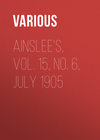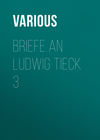Buch lesen: «Ainslee's, Vol. 15, No. 6, July 1905», Seite 17
There was the same absurd little orchestra in their same absurd “monkey clothes,” the same motley crowd of half foreign, wholly happy men and women, the same indescribable odor of un-American cooking – she even rejoiced in that– and, best of all, on the long shelf that ran around the four sides of the room were the same little, fat, bright blue pitchers with great naming vermilion roses on either side. To be sure, she knew that one was missing, but that was mere detail.
“Phil,” Nancy whispered, eagerly, pulling his coat sleeve violently as the waiter, with much bowing and scraping, started to lead the way in another direction, “our table is empty. Right over there – the tenth from the door. We always had that one, you know, under the picture of ‘The Girl with the Laughing Eyes.’ I always remembered that it was the tenth.”
“Surely, we’ll have the tenth, by all means.” Phil tapped the waiter on the back, and motioned in the direction of the empty table.
“I thought perhaps you’d rather not,” he whispered to Nancy, as they slipped into the old, familiar places. Evidently Phil had a memory for numbers, too. So often it is only the woman who can count ten.
“Now,” began Phil, as soon as the dinner had been ordered and other preliminaries attended to, “tell me how on earth you and I happen to be here together? Did you drop straight from the clouds? Or aren’t you here at all? Are you just a bit from a wildly improbable dream?”
“No,” said Nancy, glibly, her equilibrium restored; “I’m spending the night with Lilla Browning, and it suddenly occurred to me that it would be fun for us to have dinner together.” She paused a moment. “Once more,” she added, watching Phil’s face closely. “And isn’t it just like that other time – the last time we were here together?” Phil looked at her curiously. “The people, and the soft lights, and the funny little musicians, and my meeting you – ”
“Oh-h!” said Phil, quietly.
“And – and everything,” finished Nancy, lamely.
“Don’t you remember?” she went on. “The paper had sent you off on some pesky assignment, and you were just a wee bit late. And we had a sort of a tiff about it until I happened to look up at the picture over the table, and ‘The Girl with the Laughing Eyes’ was looking straight down at us? And then, somehow, I had to laugh, too, and we made up. Don’t you remember?”
Phil nodded. Did he not remember everything? Had he not been remembering ever since? That was the pity of it all!
“We were pretty happy that night, weren’t we, Phil?”
“Don’t, Nance.” Phil’s bright eyes had a curious, unusual brightness at that moment.
“And I made you – simply made you, you didn’t want to – get me one of those foolish little pitchers.” She pursued her theme relentlessly. “The waiter was so funny!” Nancy laughed merrily as at some droll recollection, “Phil, that was a whole year ago.”
“Nonsense!” said Phil, indignantly. “It’s ten years ago, if it’s a day! Before you grew to be a worldly-wise old lady, and before I had become a cynical old man.”
“You don’t look very old, Phil.”
“Well, I am; I’m as old as the hills. Do you know it has all been an awful pity, Nance?”
“What?” she asked, very softly, smiling adorably.
“Oh, everything – ” He stopped short, the smile had escaped him. “Come,” he said, abruptly, “let’s talk about the weather, the – the – what a terrible winter it has been, hasn’t it? Did you have lots of skating up in the country?”
“Yes, lots – about two months too much of it, and it has been the worst winter I ever hope to live through; but really, Phil, I didn’t come to New York to talk about the weather.” The laughter died out of Nancy’s blue eyes. “I – I think I came to New York to ask your advice about something.”
“My advice?” echoed Phil, wonderingly.
“Yes, I think so. Phil, suppose there, was a girl whose father had lost all his money and then had gone to work and died, and had left her and her mother just this side of the poorhouse. And suppose she and her mother had had to pinch and scrimp to keep their heads above the water, until they were sick of the whole business. And suppose a man with shoals of money – a fat, sort of elderly man, who wore diamond rings, and said ‘you was,’ and did lots of other things you and I don’t like, yet was very kind and good – suppose this man wanted to marry this girl. Now, what would you advise her to do, if her mother were secretly crazy to have her marry him?”
“And she didn’t care for anyone else?” Philip’s tone was coldly judicial.
“And she didn’t care for anyone else.” His coldness frightened the lie through her unwilling lips, but she went white as she uttered it.
Philip eyed her narrowly.
“I can’t see why you want my advice,” he said, dully.
Then, very suddenly: “Nancy, suppose there was a man who was rather poor, as things go nowadays, and who had once been very fond of a girl who had treated him pretty badly. And suppose there was a woman” – with swift jealousy Nancy remembered the engagement Philip had broken in order to dine with her that evening – “not a very young woman, who had shoals of money, as you say, who rouged a little, and helped nature along a little in several ways, and did a number of other things that you and I don’t exactly like, but who at heart was a very good sort – would you advise this man to marry her?”
“And he didn’t care for anyone else?” Nancy whispered.
“And he didn’t care for anyone else,” said Phil, steadily.
Nancy bit her tongue to keep from crying out. Oh, the mortification, the humiliation, of it all! She would have given a week out of her life to have been back home.
“Why, if he cared for no one else, I – ” The words came with an effort. “Who is she, Phil?”
“I’ll tell you in a moment. Who is he, Nancy?” he asked, sternly.
“James Thornton – you’ve heard of him. Oh, what a pair of worldlings we are!” She pulled herself together with a supreme effort, and, raising her glass of red Hungarian wine to her lips, said lightly: “Here’s to my successor! May she forgive me for this one last evening!” Her hand trembled, and some of the wine splashed on her white waist.
“It looks like a drop of blood.” She shivered slightly. “Champagne doesn’t stain.” Her mouth laughed, but her eyes were full of a dull despair. “When we are married we shall both be drinking that! Do you remember that foolish little song I used to sing, ‘When we are married’?” She tried to hum it, but failed miserably. “We shall sing our songs with a difference, now. Oh, Boy, Boy, it has all been my fault, hasn’t it?”
“What do you mean?” he asked, tensely.
“Oh, everything,” she said, wearily. “The worldliness and the wretchedness, and now it is too late! ‘Couldst thou not watch with me?’ Boy, I’m afraid I’m going to cry.” Her lip quivered pitifully.
“Nance, do you care?”
“Care? Of course I care!” She threw her head back defiantly, and her eyes filled with angry tears. “If I hadn’t, I shouldn’t be here to-night. I – I’d have been married two months ago. God knows I wish I had, before – before all this happened!”
“Then listen to me, Nance.” Philip spoke very quietly, but his eyes burned into her soul. “There isn’t any other woman, there never has been, there never could be. I love you, and love you only, with my whole soul, my whole strength – ”
“But you said – ” began Nancy, in a weak little voice.
“Never mind what I said,” he answered, almost roughly. “I’d sworn I’d never trouble you again without some sign from you. Yet the instant I saw you, out there on the sidewalk, it was all I could do to keep from kneeling down and kissing your blessed little shoes. But I wouldn’t have done it for fifteen thousand different worlds. Suddenly, when you were talking about that damnable man” – Phil ground his teeth savagely – “and his ‘shoals of money,’ that other idea occurred to me – a last resort, a final, forlorn hope that if you had a spark of feeling left for me you might show it then, and I made it all up out of whole cloth.”
“Philip, you’re a brute!” The tears were falling now, but the wraith of a smile hovered about the corners of Nancy’s mouth.
“I know I am. I’m despicable, mean, cowardly, unmanly – ”
“Hateful, paltry, contemptible.” Nancy helped out his collection of adjectives, but, strange to relate, her smile deepened.
“And – happy!” finished Phil, triumphantly. “Nance” – the tone was masterful – “you’ve got to marry me now, right off, to-night. I’m never going to let you get away from me again. I don’t care for all the James Thorntons and all the filthy money in the world. Will you, Little Girl?” The masterful tone gave place to one of pleading tenderness. “Will you give it all up for the man who has never stopped loving you and worshiping you for one single instant since the blessed day when you first came into his life?”
“Oh, Phil, Phil, you wicked, contemptible old darling, if you hadn’t asked me to pretty soon, I – I’d have asked you. I’ve tried to get along without you, and I just simply can’t!”
“Nance, you’re an angel!” cried Phil, rapturously. He leaned across the table, with a fine disregard of appearances, and kissed Nancy’s hands. But nobody noticed it at all – except the waiter at a respectful distance, secretly jubilant in the expectation of an unusually large tip, and he didn’t count. That is the beauty of those out-of-the-way Bohemian restaurants – people are so absorbed in their own love-making that they never have time to watch anyone else’s.
“You’re a perfect angel!” Phil declared again, fervently.
“I know I am; and I’m so happy” – Nancy’s swift transition from grave to gay was always one of her greatest charms – “that I’m afraid if I don’t get out of here pretty soon, they’ll have to call in the police, for there’s no telling what I may do! I feel like dancing a jig on top of this table!”
“I dare you,” laughed Phil, happily.
“Well, it’s only on your account that I don’t,” she said, airily. “Even though you are a liar, you look so respectable! And, oh, Phil,” she went on, irrelevantly, “I have so much to tell you. I’ll tell you all about everything – a certain fat blue pitcher I found the other day and that really brought me here to New York, about Mr. James Thornton and his artificial moonlight, and everything else – on our way to the minister’s. But I say, Phil” – here the Charles Warren, matter-of-fact strain asserted itself – “if we are going to be married to-night, we must hurry, for it’s after nine now, and I’ve got to be at Lilla’s by ten o’clock. I wouldn’t be late for anything. How surprised she’ll be when Mr. and Mrs. Philip Peirce sail in!” She looked up suddenly at the picture over the table. “Boy,” she said, very tenderly, “don’t you think ‘The Girl with the Laughing Eyes’ looks as though she approved?”
But Phil had no eyes save for the shining eyes across the table, so his answer cannot be described.
“Phil,” said Nancy, about a week later – they had just finished installing Phil’s few Lares and Penates in their new quarters – “isn’t this just the coziest little nook you’ve ever seen?”
“Absolutely,” said Phil, with conviction.
“I wish mother could see how – ” The smile was a bit wistful. “Phil, I really think we ought to go up to see mother. Of course she’s furious – her not answering our telegram is proof positive of that. I’m scared to death at the thought of seeing her. She can look you through and through so, when she disapproves! I do think she might have written. We haven’t done anything so perfectly dreadful. You don’t suppose she is sick, do you?” she asked, anxiously.
“Why, no, Little Girl,” said Phil, soothingly; “we’d have heard in some way if there had been anything of that sort.”
“I think I’m getting nervous about her. Will you go up with me to-day, dear?”
“Why, certainly, Nance; whenever you want to go, just say the word. I’m having a holiday now!” Phil laughed like a happy schoolboy.
“All right, then, we’ll go to-day. And please be on your very bestest behavior, Philly-Boy.”
“Don’t worry. I’ll be the dutiful son to the queen’s taste.”
“And be sure,” adjured Nancy, solemnly, “to tell mother you’re really making quite a lot of money now, that we’re not starving, and that I’m going to have some new clothes the first of next month.”
Late that afternoon, Mr. and Mrs. Philip Peirce reached the Warren house. Three pulls at the bell brought no response, and all rattlings and shakings of the doorknob were without result. The door was as tightly closed as though it never expected to be opened again till the crack o’ doom.
At the back of the house the same conditions existed. Not a door, not a window, would yield.
Nancy was plainly vexed. “The Prodigal Son had a much better time than this when he came home,” she complained, ruefully.
She and Phil walked around to the front of the house again, and down the nasturtium-bordered path that led from the porch to the street. There was absolutely no sign of life anywhere.
Suddenly, Nancy heard the “touf-touf” of an automobile, and down the road at a rapid pace came Mr. James Thornton’s gorgeous machine, the chauffeur its sole occupant.
“Henry,” she said, walking to the edge of the sidewalk, “can you tell me where Mrs. Warren is?”
“No, miss, I cannot.” He drew himself up stiffly. Mrs. Warren’s daughter was evidently in his bad books.
“Is Mr. Thornton at home?” she asked, timidly.
“No, miss, he is not.” His lips clicked. Then, with sudden condescension, and head held very high, eyes looking straight ahead, he added: “Mr. Thornton is away on his wedding trip.”
“His what?” gasped Nancy, weakly.
“Him and Mrs. Warren was married yesterday,” he said, proudly. “She’s a fine, fine lady!” And, touching the visor of his cap, he started the machine down the street.
Nancy leaned against a tree, too stunned for words. Then, as the humor of the whole situation flashed over her, she began to laugh, and laughed until, for lack of breath, she couldn’t laugh any longer.
“Why, it’s – the funniest thing – I’ve ever heard of, Phil!” she gasped.
“Well, it keeps the ‘shoals of money’ in the family!” said Phil, philosophically, and then he howled.
“Yes,” Nancy mused, still panting for breath, “mother once said that if I let him slip through my fingers some one else would snap him up before you could say ‘Jack Robinson.” Her eyes danced. “I wonder if anyone said ‘Jack Robinson’?”
“No, darling, there wasn’t time. But, at any rate, we’ve made our wedding call on our parents,” said Phil, gayly, “and I think we might as well go back to ‘little old New York’!”
Then, hand in hand, like two gladsome children, Mr. and Mrs. Philip Peirce retraced their steps toward the station.
THE LADY & THE CAR
By Churchill Williams
And, if you don’t mind, old fellow, will you bring over the guns yourself?”
That had been Tony Rennert’s parting charge as he bolted from the breakfast table at the Agawan Club for the dogcart which was scheduled to make connections with the eight-forty-five for the city. Two days before, after eighteen months of leisurely travel abroad, I had been met on landing with Tony’s urgent message to join him in bachelor quarters at the Agawan, and with an alacrity born of the wish to get close again to one of the “old crowd,” I had straightway come down to the club in the twenty-horse-power car which had carried me faithfully for six weeks over the French roads. Come down to find myself among a lot of men I did not know and for whom, to be entirely frank, I did not care.
Agawan had changed since last I was there. Then it was a big, comfortable shooting box, with a good cook, an old-fashioned barn, and, behind it, kennels for half a dozen clever dogs. Now it was triple its former size, rebuilt and modernized, with many bedrooms, a double-deck piazza and a dancing floor. The barn was gone, a fine stable had taken its place, and tennis courts and golf links occupied a large part of its one-time brush-grown pasturage and sloping meadows. In short, it was a country club, glaring in its fresh paint and with all the abominations which the name of that institution suggests to a man to whom knickerbockers and loose coats, a gun, a dog, a pipe and never the flutter of a petticoat the whole day long give selfish but complete satisfaction.
Tony had fallen into evil ways. I suspected as much as soon as I saw the manner of his living; I was sure of it when he informed me, with detestable glee, that there was to be a big house-warming dance the following evening, at which – well, Morleton, three miles away, had undergone a boom in my absence, and from the houses there and from the city, too, were to come – girls. Privately I made up my mind that the dance was a thing I would miss, and Tony must have read disapproval on my face, for he said no more about the festivities, and a little later proposed the shooting. There were woodcock left in the marshes; he had seen them – by accident, I guessed. He would send to the city for the guns, and we would put in a good day together. That sounded better, and I acquiesced promptly.
But before we had arisen from the table a waiter brought a telegram, and Tony’s face fell into glum lines. It was an important business message and called him to the city over the next night. There was no help for it, he explained; but, as I had my car, he hoped I would worry it out alone till he got back. He would send down the guns by express against a further delay, and – there a lingering spark of his former affection for the twelve-bores glowed into life – would I personally see that they came over from the railroad station safely?
So it was that, a little after nine o’clock the following evening, in accordance with a wire from Tony, I drew up at the station platform just as the last train pulled in. A vibrator spring on the car was badly out of tune; I was bent over, testing it, when a voice exclaimed, joyfully, almost at my elbow: “Oh, there you are! What a scare I have had!”
I started and looked up. The impression I got was of a modish and very much up-tilted hat and of a veil which hid everything beneath its brim and the collar of a long, loose coat. These and nothing much besides; for the single post-lamp left the platform in semi-darkness. But I realized that this was a lady who addressed me, and that there was a mistake which I could not too speedily correct.
“I beg your pardon,” I said, “but you see – ”
“Of course I do,” the voice interrupted. “If I had not, I dare say I would have sat on the station platform until – until you had finished fussing with that old machine of yours. Oh! I have heard all about your pet weakness. It was by the car I identified you. But I forgive you. You have waited a whole train for me. Go on with your tinkering. Only let me have a seat in the car, and tell the agent to bring over my trunk.”
“Trunk!” I echoed.
“Yes, trunk! But not a very large one – you see, it is only for a few days. It will go nicely in the – now, what do you call the back part of your car?”
“The tonneau? But, really – ”
The hat tilted just a shade more, and I was silenced by the command: “Not another word! Positively, you would keep me standing here forever. I had no idea you were so – contentious. Please help me in, and please have my trunk brought over. Here is my check. Then, if you insist, we can discuss the propriety of trunks on our way to the clubhouse.”
I hesitated; but I gave her my arm, and, when she had settled herself in the seat beside the driver’s, I walked over to where the agent stood beside the guns and a steamer trunk of modest size. I picked up the guns and told him to bring over the trunk. Together we put it into the tonneau, the while I debated with myself what to do and what to say. As a matter of fact, there seemed to be small choice. The lady was plainly determined to listen to no explanations. Moreover, to attempt to make her mistake clear to her just now was to place her in an embarrassing predicament; for whoever was to have met her had failed to appear, and already the station master had began to extinguish the lights. I caught at her words “the clubhouse.” That could be none other than the Agawan. Well, I would take her there; the trip should be quickly made, and I would do my best to keep her in ignorance of my identity, at least until she was among friends.
“Now, this is very nice,” she said, as I threw in the high gear and we shot into the darkness. “I’ve never been in an automobile before; we have very few of them in” – she named a little town in the South. “You must explain everything to me.”
I welcomed the invitation, and promised myself to keep the topic alive as long as there was need for conversation. But I had hardly begun an enthusiastic exposition of the principles of a four-cylinder, gear-driven, twenty-horse-power, French touring car, when she checked me. “I forgot,” she said. “We have never met before. We must start fair. You are to call me ‘Margery’; I hate ‘Miss Gans’ from one who is really an old friend. And I shall call you – let me see? – yes, for the present, I shall call you ‘Mr. Page.’”
I started. Who would not have started? “Page” is my Christian name. And I was to call her “Margery”? For just the briefest moment I wondered if my first impression of my companion could have been amiss. But I rallied my self-command and such shreds of gallantry as my life and my convictions had left. Undeniably she was a pretty girl, despite the disguising veil.
“It is a bargain,” I said. “I shall hold you to it. But why the ‘Mister Page’?”
“Toll to convention,” she answered. “Besides, what would Edith say?”
That was a poser. Who in thunder was Edith? But I felt that I was on the right track. “As for Edith,” I returned, “I don’t believe she would object.”
She shook her head wisely. “Well, per-haps not. But even ten years’ friendship has its breaking point. And a wife – ” She stopped there. She seemed to be considering the question.
“Doesn’t it depend upon who is the wife?” I interpolated. Now I should learn if it was really I who was married.
“Yes,” she admitted. “But yours! Oh, I know Edith! Better even than you do. I knew her long before you had even heard of her, and I could have told you things which would have been – useful to you – if only you had come to me first.”
The thought was alluring. “I wish I had,” I said, with more fervor than discretion.
She turned upon me quickly, and her face was very close to my own for an instant. Through the veil I managed to get a glimpse of her eyes. They pleased me immensely. “Why? Why? What do you mean?” she asked. There was a soft little lift to her voice which affected me queerly. I made sure that some part of me had made a short circuit with one of the battery wires. Then she lifted her chin. “But – nonsense!” she said. “How could you? I was in a convent school when you met and married Edith.”
“And you haven’t seen her since?”
“Since she was married? You know I haven’t, you goose! Why, it is tonight I make my entrée into the world of fashion?”
“At Agawan,” I hazarded.
She nodded. “Where else? And you are to dance with me many times. Remember, I know none of the men there.”
For the first time in my life I ceased to feel scorn for an accomplishment which I did not possess. But dancing, I reflected, was of the future, and the future must provide against itself. “Margery” was very much of the present. Then abruptly it occurred to me that the present would soon be of the past if we continued to travel as we were now moving; and I promptly cut down our speed by one-half. I explained that the rest of the road to the club was dangerous at night.
She gave a little shiver. “And there is no other road?”
I remembered that there was – a longer road – and at the first turn to the right I took to it. In a way it was a safer road, and if there was an accident – what would “Edith” say?
We slipped along in silence for a while. Then I asked her if she was warm enough. It was a balmy evening, with the faintest of air stirring. She laughed.
Her amusement stung me, but I had just identified a landmark, and knew the clubhouse to be less than a mile away. So I made another brilliant sally. “I am coming to that dance!” I announced.
She regarded me with an amazement which was obvious, though I could not see her face. And then, “Will you please to tell me,” she inquired, “just when you made up your mind to that heroic act?”
After-reflection convinced me that nothing less than a criminal mistake in the mixing of my Rhine wine and seltzer was responsible for my reply. “Since I saw you,” I answered, solemnly.
“Since you saw me?” Then something in the statement, of which I was not immediately aware, appeared to impress her with its humor. She laughed.
I gave the steering wheel a vicious jerk. We sheered dangerously. She uttered a little, frightened cry, and her gloved fingers closed upon my wrist. I was absolutely certain I had short-circuited a battery wire when, her hand still resting on my arm, she pleaded: “Forgive me for laughing. I remember now that Edith said you did not dance. You are coming this evening just for me, aren’t you?”
What reply was there but the one I made?
“You poor fellow,” she went on, and it seemed as if there were a soft pressure from her fingers. “You poor fellow. But – I tell you what we will do. We will watch the dancing together – as often as I can steal away. And we will have a long talk by ourselves, if-if – ”
“If what?” I asked.
“If Edith doesn’t mind!”
“Damn Edith!” was on my tongue, but politeness, rather than common sense, transmuted the sentence. “Oh, Edith won’t mind,” I declared, with conviction. And thereat we both laughed – though why, I am not sure. But all at once we seemed to know each other much better. And then the lights of the clubhouse came into view across the lawn, and we turned into the big gates.
During the passage of the driveway I devised an explanation. It was intended to salve my conscience for not plumping out the truth. The Lord alone knows what I intended should ensue. One thing only was clear to me – we would have that “long talk to ourselves,” if it could be contrived. So it was agreed between us that I was to come up to the dancing floor as soon as I had stabled the automobile and put on evening clothes. Our exact meeting place was a vague locality described by her as “wherever Edith is.”
With that understanding we parted at the door of the clubhouse. I heard an attendant direct her to the ladies’ dressing room, and him I commissioned to have her trunk conveyed where she might wish. As she disappeared within the doorway her hat brim gave me a saucy little nod of farewell.
When I was in my room the enormity of my offense and the absurdity of my position were forced upon me. Here I was impersonating another man and under promise to meet my victim in the very presence of the wife of the man I impersonated, perhaps face to face with the man himself. There could be no explanation, no palliation of the trick I had played, which would allow me to retire with a resemblance of countenance. Who would credit my statement of innocence, even was I willing to throw the burden of the mistake on the shoulders of – Margery? Margery! I pronounced the name aloud, but in a whisper, and liked the sound of it so well that I said it again.
Then I realized that I was standing in front of my shaving mirror, one hand clasping a collar, the other a tie, and that the glass reflected an expression positively disgusting in its rapture. I chucked the collar into a corner and sat down on the edge of the bed to think it out. At the end of twenty minutes I was where I had started in. But my mind was made up. At least she should not find me a coward. I would do exactly as I had promised.
I shaved and dressed. Half an hour later I was standing in the doorway of the dancing floor trying to discover where “Edith” was.
But “my wife,” if present, inconsiderately was concealing her identity in the faces and figures of half a hundred or more women, not one of whom I knew. Margery apparently had not yet come upon the floor, or – the horrid thought obtruded itself – she had discovered who I was, or, rather, who I was not. And what more likely? I had been an ass not to think of this before. And as to the consequences? Each possibility was a shade more humiliating than the one before.
Then, just as I was about to turn away to hide myself, to forget myself, anywhere, anyhow, I saw Margery; and, to save my soul, I could not have left without a lingering look by which to remember all the sweet lines of her face and figure. Bereft of that long coat and close veil, for the first time I saw what I had only guessed at before. She had stepped from the shelter of a palm to lay a detaining hand upon the arm of an older woman; and as she stood there, with bright eyes regarding the dancers, her head tilted back, the thought of flight fled from me.
The woman she stood beside was not “Edith,” but Mrs. “Ted” Mason – the wife of one of the best fellows I ever knew, and a stanch friend of mine. Instantly my resolve was made. Mrs. “Ted’s” loyalty should be put to the supreme test. She should be my confessor, and, unless I was mistaken, the counsel for my defense. I started on my way around the hem of promenaders.
Twice I was delayed by the incursions of dancers, and when I reached the side of my prospective ally she was alone. Out on the floor a slender figure in lavender was smiling in the face of her partner – a man I knew I was to dislike exceedingly when I should meet him.
Mrs. “Ted’s” eyes grew big when I stood before her. And when she spoke it was with the air of a tragedy queen. “Do I see aright? Is it you? Or is it your wraith? Is this Page Winslow? And is this scene of revelry – a dancing floor? Oh, Page, Page! In my old age to give me this shock is cruel – unlike you – utterly cruel, I say!”
My face burned for the shame I could not conceal, but I was beyond the point where any attack was to divert me. I explained – lies came so readily now. I was present to-night by promise to Tony Rennert, I said. Only by engaging to show myself at the dance had I been able to persuade him to give me his company for a day’s shooting. And Tony was detained in the city, and I was here alone, unprotected, liable at any moment to be seized with stage fright and to swoon. Such a thing would be disgraceful and embarrassing as well to all my friends – in other words, to herself. No, I corrected myself, that was not quite true. There was one other person present who might remember me – a Miss Gans —




















